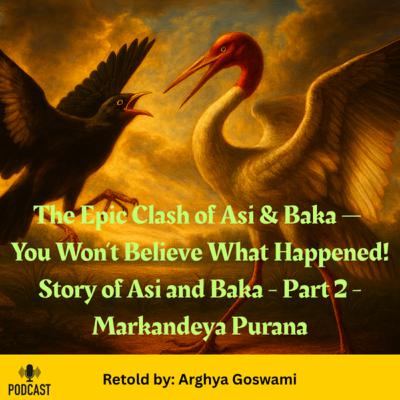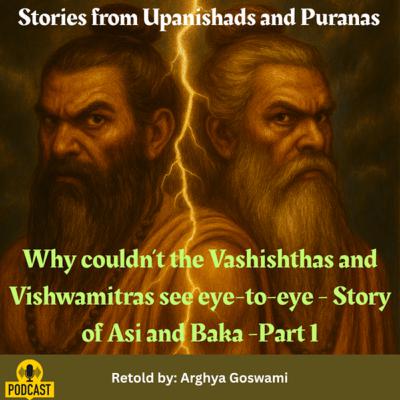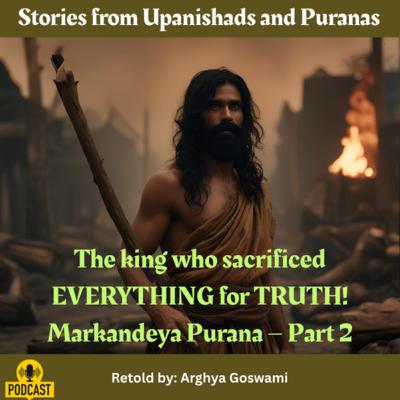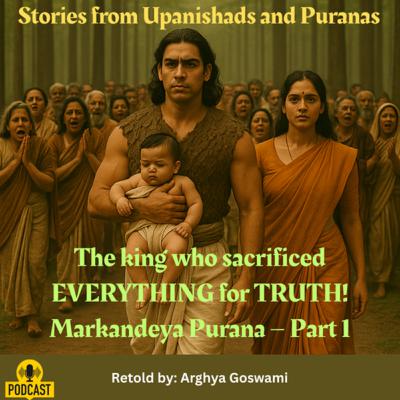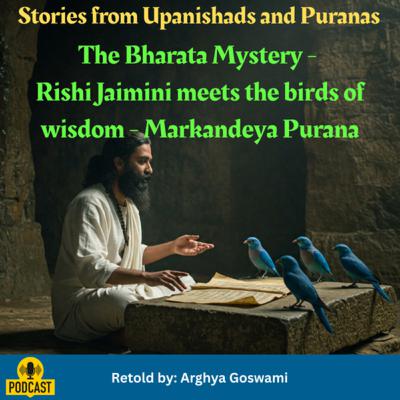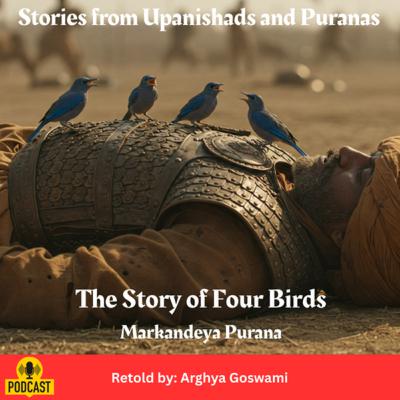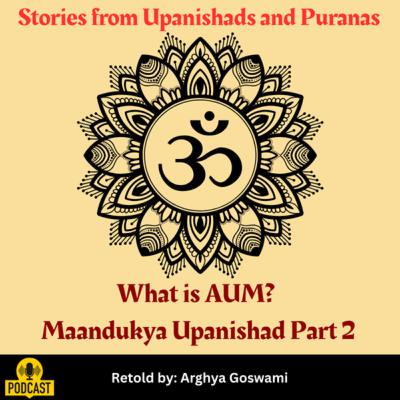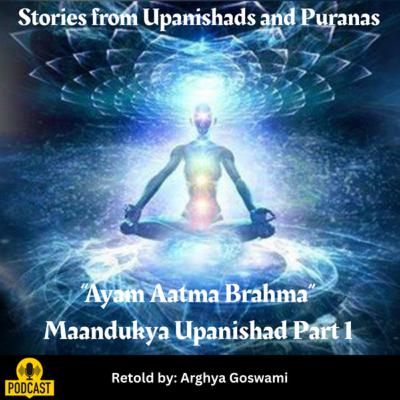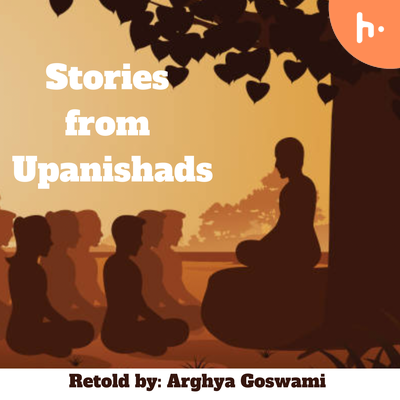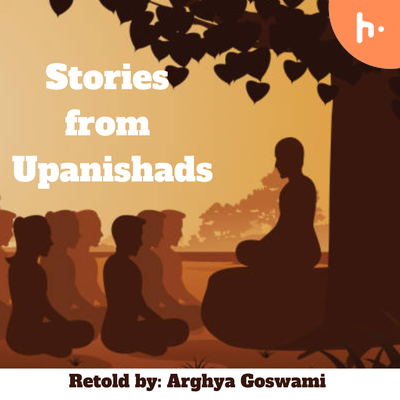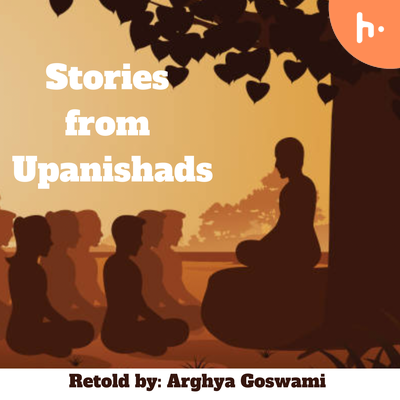Discover Stories from Upaniṣhads and Puranas
Stories from Upaniṣhads and Puranas

Stories from Upaniṣhads and Puranas
Author: Arghya Goswami
Subscribed: 115Played: 360Subscribe
Share
© Arghya Goswami
Description
Our Sanatan is a treasure trove of philosophies and life lessons. The Upanishads delve into concepts like "Self-realisation", "Brahman" or "Supreme Being" and "Atman" or "Supreme Self". Puranas grasp the concept of the Supreme power using the medium of stories. Upanishads and Vedas are technically superior in terms of philosophies and thought processes, making them challenging for common people to understand, but the Puranas present similar ideas in a more accessible and interesting story format.
Please subscribe, download, and follow the podcast series.
Aum Shantih, Shantih, Shantih!
Please subscribe, download, and follow the podcast series.
Aum Shantih, Shantih, Shantih!
33 Episodes
Reverse
This is a continuation of my previous episode, "Why couldn't the Vashisthas and Vishwamitras see eye-to-eye? Story of Asi and Baka - Part 1". In this episode, I will narrate the story when Sage Vasistha, as "Asi" or Bank Mynah, who clashed in a deadly duel with Sage Vishwamitra as "Baka" or Indian Crane. Do you want to know what happened when these two super-powered birds fought with each other?Please listen to this episode to complete the story of Asi and Baka from the Markandeya Purana.This podcast is available both in Video and Audio formats.Video on YouTube format:https://youtube.com/@storiesfromupanishadspuranas?si=CnjtJjNHSZawGixXAudio Podcasts available on:Apple Podcast:podcasts.apple.com/in/podcast/stories-from-upanishads/id1645159771Spotify:open.spotify.com/show/7cls2BIlQSD9Suyiikz6moAmazon Music:https://music.amazon.in/podcasts/a5296ad4-00c3-453d-9215-a99466971d20/stories-from-upani%E1%B9%A3hads-and-puranasPodtail:https://podtail.com/en/podcast/stories-from-upanishads/Podcast Index:https://podcastindex.org/podcast/5687603Podcast Addict:https://podcastaddict.com/podcast/stories-from-upanishads-and-puranas/5896606Request: If you really gain something listening to my podcast, please do follow, like, subscribe, download and share. This would mean a lot to me. Contact:You can contact me at "arghyathinks@gmail.com"
Discover the age-old rivalry between the Vashisthas and Vishwamitras in this captivating tale from ancient Indian mythology. Learn about the story of Asi and Baka in the first part of this epic series! #ramayana #mahabharata #Rig Veda #Vasishtha #Vishwamitra #Battle of Ten Kings #Dasarajna WarWelcome to Stories from Upanishads and Puranas – a channel where timeless wisdom meets soulful storytelling. Discover deep spiritual truths, explore the lives of sages, gods, and kings, and uncover the ancient philosophy that continues to guide millions even today.Whether you're here for devotion, reflection, or learning, these sacred stories are meant to awaken the divine within you.Don’t forget to like, comment, and subscribe for new episodes.Let truth, dharma, and wisdom light your path.Today's story is a precursor to the Story of Asi and Baka, which is mentioned in the Markandeya Purana. The episode deals with three accounts where I confirm some kind of antipathy between two great Sage lineages over the ages. The accounts can be found in Ramayana, Mahabharata and also in the Rg Veda. In this episode, we will find out why Vashishthas and Vishwamitras have always had enmity with each other over the ages. #ramayan #ramayana #mahabharat #mahabharata #rigveda #rigved #rigvedasuktas #dasarajnawar#battleoftenkings#parusuni#vedicindia #kingsudas#BattleofTenKings#Mandala7#upanishads #Puranas #HinduMythology #IndianWisdom#SatyamevaJayate #MundakaUpanishad #TwoBirdsStory #VedanticWisdom #TruthShallPrevail#SpiritualStories #SanatanaDharma #VedicPhilosophy #MythologyExplained #Bhakti#BharataMystery #RishiJaimini #BirdsOfWisdom #MahabharataSecrets #PuranicWisdom#FourBirds #UpanishadicTales #SymbolismInHinduism #SpiritualStories #WhatTheThunderSaid #BrihadaranyakaUpanishad #DaDaDa #SpiritualThunder #VedanticMessages#TSElliot#KenaUpanishad #BrahmanAndTheGods #UpanishadicWisdom #HinduPhilosophy #VedantaEssence#Nachiketa #Yama #KathoUpanishad #DeathAndImmortality #UpanishadicDialogue#KingBrihadratha #MokshaPath #MaitreyaUpanishad #SpiritualRenunciation #VedantaTeachings#AyamAatmaBrahma #MandukyaUpanishad #SelfIsBrahman #AdvaitaVedanta #AUMMeaning#Narada #Sanatkumara #ChandogyaUpanishad #SpiritualKnowledge #SeekersPath#Yajnavalkya #KingJanaka #BrihadaranyakaUpanishad #SpiritualWisdom #VedanticKings#Balaki #SpiritualHumility #ChandogyaUpanishad #VedanticLessons #PrideAndKnowledge#ThreeFriendsStory #UpanishadicDialogue #SpiritualJourney #VedicFriendship #AncientIndiaWisdom#WhatIsAUM #MandukyaUpanishad #AUMExplained #OmMantra #VedanticSymbolism#YajnavalkyaMaitreyi #BrihadaranyakaUpanishad #SpiritualLove #WisdomAndRenunciation #NonAttachment#StoryOfPraana #VitalEnergy #VedicScience #UpanishadicEnergy #LifeForceInHinduism#KingJanashruti #Raikwa #ChandogyaUpanishad #HiddenWisdom #HumbleTeacherStory#Satyakama #TruthSeeker #VedanticInitiation #SpiritualIdentity#PerfectTeacher #Satyakama #Upakosala #GuruShishya #ChandogyaTeachings
"What would you sacrifice for the truth? Your wealth? Your crown? Your family? This is the story of a man who gave up everything — not for power, not for glory, but for dharma. Step into the fire-lit world of King Harishchandra, where honesty clashes with fate, and the gods themselves become spectators to a mortal’s uncompromising integrity. This is not just mythology — it's a mirror of timeless courage. In this part 2 of the 2-part podcast story -"The King Who Sacrified Everything for Truth", from Markandeya Purana, we will know the answers-What happened when Sage Vishwamitra looked into the dakshina given to him by Harishchandra after selling off his wife and son? Was Harishchandra able to pay off his debt? Were there more misfortunes stored for him? Was he able to reunite with his wife and son? You can listen to the audio podcast in most of the popular podcast platforms such as Spotify, Apple Podcast, Amazon Prime Music and many others. Also, this podcast will be available in a video format on YouTube, and the name of the channel is "https://www.youtube.com/@StoriesfromUpanishadsPuranas"Please visit the webpage https://www.storiesfromupanishadsandpuranas.com/ For more content and blogs. #puranas#storiesfrompuranas#markandeya purana#Raja Harishchandra#Harishchandra#Hindu Scriptures#Sanatan Dharma#Sanatan#Indian Scriptures#Sage Vishwamitra
What’s the real price of a promise? A piece of gold? A bit of land? For one legendary king, the price of his word was far, far greater. It wasn't his crown or his vast, prosperous kingdom. The ultimate cost of his promise was his beloved wife, his only son, and himself. This is the story of a kingso devoted to truth that he was forced to sell his own family and himself into slavery. It's a story that pushes the very limits of honour, sacrifice, and what a human being can endure. This is the story of the great Ikshvaku King, ancestor of Lord Rama, Raja Harishchandra! This podcast is part 1 of a 2-part story on Raja Harishchandra from Markandeya Purana.We’d love to hear from you in the comments: Do you think one must keep their promise, and to what level one must go to fulfil that in today’s times? Please comment or write to me at arghyathinks@gmail.com! This podcast is available in audio format on all majorpodcast platforms. It is also available in video format on YouTube, and my channel name is “Stories from Upanishads and Puranas”.
Dear Friends and listeners,Welcome to another brand new episode from my podcast series -"Stories from Upanishads and Puranas". This episode is in continuation of my previous episode -"The story of four birds". This episode looks further into Rishi Jaimini's journey in search of four talking birds and finally getting his questions on "Bharata" answered. The episodes delve into the explanation of four forms of Vishnu and tell us why Balaram went on a pilgrimage after murdering Sage Suta Lomaharshana. It also throws light on a mysterious question: why Draupadi married five Pandavas and why the sons of Draupadi were murdered at a very young age! So hold on tight and listen to my podcast - "The Bharata Mystery - Rishi Jaimini meets the talking birds".This podcast is also available in audio format on most leading podcast players, including Spotify, Amazon Music, and Gaana. Please ensure to follow, subscribe and like the podcast.Furthermore, this podcast is available in video form on YouTube. The link to YouTube is -https://youtu.be/Buep4YOmk88?si=o0QGk49Hu1vRwVVt
This is my first story from the Puranas, and as I told youall last time, in my channel, I will narrate stories from both the Upanishads and the Puranas. So please like, share, and subscribe to my channel if you haven’t done so. Also, if you want to have a direct conversation with me, pleaseemail me at arghyathinks@gmail.com.Rishi Jaimini had a few intriguing questions on the great text named "Bharata", so he asked Sage Markandeya about them. Sage Markendeya redirected Rishi Jaimini to the four birds who knew everything about "Bharata". These birds were learned and could talk in a human voice. Today's podcast is from the Markandeya Purana and the story tells us about the four birds.Who were these four birds who knew everything about the great battle of Kurukshetra?Why were they able to talk in human voice and possess Vedic knowledge?Let's dive deep into this new episode in the channel "Stories from Upanishads and Puranas"
Today's story is taken from Maitreya Upanishad. This story is featured in chapter 1 of the Upanishad. This chapter describes the dialogue between the great ascetic king Brihaadratha from the Ikshvaaku dynasty or Solar dynasty and Sage Saakaayana. Please like, share, subscribe and download my podcast “Stories from Upanishads”, available on multiple podcast streaming platforms. Also, visit my website https://www.storiesfromupanishads.com, listen to my earlier podcast episodes, and read some of the blogs available.From now on my podcast will also be available on Youtube. You can search YouTube using the following link - https://www.youtube.com/@StoriesfromUpanishads/featured#upanishads#upanishad#maitreyaUpanishad#aatman
The part 2 of Maandukya Upanishad deals with "AUM". It describes verses 8-12 from the Upanishad. It tells us about "AUM", how do you pronounce it? What happens when you chant "AUM" and many other secrets lying hidden in the syllable "AUM"?How it is connected to Viraat Purush, Hiraanyagarbha, Ishwara and Brahman? Why silence is "Turiya" the fourth quarter of Aatman? How do you perform Aum Kara Dhyaanam?Come with me and dive into a journey full of mysticism and unknowns. This podcast was created on Hubhopper studio. If you wish to start your own podcast for free, visit www.hubhopperstudio.com. Hubhopper is India's leading podcast creation platform. Start your podcast with Hubhopper studio & get your voice heard across platforms like Spotify, Gaana, Google podcasts, Wynk Music and more. Click on the link in the episode description or visit www.hubhopperstudio.com.” Source content collected from various books on Upanishads such as “Messages of the Upanishads” by Swami Ranganathanada, “The Brhadaaranyaka Upanishad” by Swami Madhavananda, “Eight Upanishads” from Advaita Ashrama, Upanishads.org, “Vedas and Upanishads for Children” by Roopa Pai and several other write-ups and thoughts on Upanishads. Background Music is sourced from various royalty-free music sources, Apple Loops and Internet Archives with a Non-Commercial 4.0 International license. Aum Shantih chants are from Youtube - source - Gaiea Sanskrit.The Concept, Script, Narration and Audio Design: Arghya GoswamiYou can listen to all my podcast episodes in my exclusive website: https://www.storiesfromupanishads.comalso, you can read through some of my blogs and shop at ExoticIndia. ExoticIndia has a fabulous collection of rare books, jewellery, art objects and paintings. Spotify link: https://spoti.fi/3DVRcofAmazon Music: https://amzn.to/3qxbaCFGaana link: https://bit.ly/3KC9GxVApple Podcast link: https://apple.co/3ORZrrHGoogle Podcast link: https://bit.ly/3QybEDg#upanishads#upanishad#upanishadstories#upanishadquotes#upanishadganga#upnisads#mahavaakya#mahavaakyas#mandukyaupanishad#mandukya#storiesfromupanishads#storiesfromupnishad#vedic#adwaita#advaitavedanta#advaita#advaitavedānta
This is the 1st part of the Maandukya Upanishad in which the teacher describes the 4 states of Self. This episode also describes one of the Mahaavaakya from Upanishad -"Ayam Aatma Brahma" which means - "This Self is Brahman". As told in Muktika Upanishad, Maandukya Upanishad is the most important of all the 108 Upanishads. So come on friends, let's embark on a journey to know more about this wonderful ancient text. This podcast is available on almost all podcast platforms such as - Apple Podcast, Spotify, Amazon Music, Google Podcasts, Stitcher, Blubrry Podcasts, and many other podcast players.You can listen to the podcast on my exclusive website https://www.storiesfromupanishads.com. Furthermore, as a bonus, you can read through some interesting blogs and shop from ExoticIndia. ExoticIndia is India’s leading online store where you can find rare books, brass articles, idols, and many others.Also, I would request you all to like, share, follow, and download the podcast. Also, leave some of your valuable comments and reviews on various platforms you are listening to. Also, you can get in touch with me by writing to me at arghyathinks@gmail.com.
Dear friends,I am back with the next part of the story - "What are the paths of liberation". The episode will tell you about types of Vaasanaas or desires, what are the fluctuations of the mind and how to control it, what are jivan mukti and Videha mukti. I hope you will love this episode as you have loved the previous part. Please visit the website, https://www.storiesfromupanishads.com, read the blogs, and listen to the earlier episodes. Also, you can shop from ExoticIndia, which houses a great collection of collectibles, rare books and artefacts. Please click on the button "Shop Now" to access the website. Do write to me in my email arghyathinks@gmail.com as many of my listeners often write to me and discuss with me various topics. Source content collected from various books on Upanishads such as “Messages of the Upanishads” by Swami Ranganathanada, “The Brhadaaranyaka Upanishad” by Swami Madhavananda, “Eight Upanishads” from Advaita Ashrama, Upanishads.org, “Vedas and Upanishads for Children” by Roopa Pai and several other write-ups and thoughts on Upanishads. Background Music is sourced from various royalty-free music sources, Apple Loops and Internet Archives with a Non-Commercial 4.0 International license. Aum Shantih chants are from Youtube - source - Gaiea Sanskrit. Excerpts from the Mangal Bhavan are taken from Ramacharitamanas, sung by Anup Jalota. The Concept, Script, Narration and Audio Design: Arghya Goswami#upanishads#upnisads#upanisads#satyamevajayate#podcasts#StoriesfromUpanishads#MundakaUpanishad#NationalMotto#NationalEmblem#Spotify#GaanaPodcast#podcastshow#podcaster#GaanaPodcast#amazonmusicPodcast#spotifypodcast#podcast#podcasting#podcastshow#podcaster#podcastlife#Hubhopper#podtail#googlepodcasts#applepodcasts#podbeanpodcast#upanishads #upanishad #upanishadquotes #upanishadquotes #indianpodcast #indianscriptures #vedic #indianphilosophy #podcastindia #indiapodcast #indiapodcasters #vedicposts #spiritualpodcast #spiritualpodcasts #spiritualpodcasting #upanishad #upnishads
Muktika Upanishad is the last of the 108 Upanishads which is derived from Shukla Yajur Veda. I have extracted this story from this upanishad which presents a dialogue between Lord Shree Ramchandra and Lord Hanuman, where in Hanuman asks Lord Ram about the vedanta, upanishads and paths of salvation. This episode features adhyaya 1 or chapter 1 from the Upanishad.Do you know what are the 108 Upanishads? How they are categorised? What are the different shanti mantras of each category of Upanishad? What are the different paths of liberation? What is "Kaivalya", the highest state of emancipation? To know more, please listen to this episode. Please don’t forget to like, subscribe, follow, rate and leave some review comments on my podcast series - Stories from Upanishads and on this episode. Do write to me in my email arghyathinks@gmail.com as many of my listeners often write to me and discuss with me on various topics.Also do visit the exclusive website of my podcast series - "Stories from Upanishads". The url is https://www.storiesfromupanishads.com/ to get some more information in form of blogs, collection of all my previous podcast episodes and an exciting offer from ExoticIndia. ExoticIndia which offers a unique selection of products that reflect the cultural traditions and lifestyle of India. You can directly access their website using the link provided in the button “Shop now” in my website.Direct link to Exotic India -https://www.exoticindiaart.com/sculptures/brass/aff11769/
Satyameva Jayate Na-anrtam - satyena panthaa vitato devayaanah |Yen-aakramanty-rsayo hyaapta-kaamaa - Yatr tat satyasya paramam nidhaanam ||Which means - Truth alone triumphs not untruth. By truth is laid out the divine path, which the seers who are free from desires, reach to the supreme abode of truth”.This is story from Mundaka Upanishad and describes a dialogue between Sage Angiras and his student Shaunaka. What are the two types of knowledge? Which one is the lower and which one is the higher? What is Satyam or Truth? Can Aatman and Brahman reside in the same body?Many questions are answered in this story. So hold on tight and enjoy the story from which our national motto was taken. Visit my website: https://www.storiesfromupanishads.com/Visit ExoticIndia via link:https://www.exoticindiaart.com/sculptures/brass/aff11769/Spotify link -https://open.spotify.com/show/7cls2BIlQSD9Suyiikz6moAmazon music: https://music.amazon.in/podcasts/a5296ad4-00c3-453d-9215-a99466971d20/stories-from-upanishadsGaana link - https://gaana.com/podcast/stories-from-upanishads-season-1Apple Podcast link - https://podcasts.apple.com/in/podcast/stories-from-upanishads/id1645159771 Google Podcast link - https://podcasts.google.com/feed/aHR0cHM6Ly9mZWVkcy5odWJob3BwZXIuY29tLzkxNmQ3NTdiMGUxZjM3NTk3NjQwN2MxN2M2ODFjNTE0LnJzcw?sa=X&ved=0CAMQ9sEGahcKEwiwgOjmjJX6AhUAAAAAHQAAAAAQVgPodcastindex - https://podcastindex.org/podcast/5687603PodTail - https://podtail.com/en/podcast/stories-from-upanishads/https://podcasts.apple.com/us/podcast/stories-from-upanishads/id1645159771?ign-itscg=30200&ign-itsct=podtail_podcastsPodcast addict - https://podcastaddict.com/podcast/4096844Hubhopper - https://hubhopper.com/podcast/stories-from-upanishads/406300https://www.audacy.com/podcast/stories-from-upanishads-ccbb7https://podtail.com/podcast/stories-from-upanishads/https://www.imdb.com/title/tt27430303/https://www.boomplay.com/podcasts/59201?srModel=COPYLINK&srList=WEBhttps://www.podchaser.com/podcasts/stories-from-upanishads-4881609/episodes/recenthttps://www.scribd.com/podcast-show/598492571/Stories-from-Upanishadshttps://www.ivoox.com/en/podcast-stories-from-upanishads_sq_f11669529_1.html#upanishads #upanishadquotes #upanishad #upanishadstories #upanishadstudy #upnishads #upnishadganga #vedic #philosophy #vedicphilosophy #sanatandharma #sanatandharma #hinduism #stories #storiesofupanishads#storiesfromupanishads #applepodcasts #spotifypodcast #spotifypodcasts #spotifypodcastsindia #googlepodcasts #hubhopper #hubhopperpodcasts #indianpodcast #india #prashnaupanishads #imdb #aum #om
This episode is in continuation of last week's podcast episode on Prashna Upanishad - Shat Prashna. It is a collection of 6 questions asked by 6 different students to their guru Sage Pipalada. In today's episode, the next 3 set of questions and their responses are retold. The 4th question was asked by Gaargya on what is that thing which sleeps when a man sleeps which awakes when he is awakened, who really sees his dreams? The 5th question was asked by Satyakama Saiba on benefits of chanting AUM and how one must recite it. The last question was asked by Sukesha Bharadwaja on 16 parts of Aatman. This episode also has a small snippet from Ustad Bade Ghulam Ali Khan's famous bhajan = "Hari Aum Tat Sat"So sit back and enjoy today's episode which is treasured with importance of reciting AUM. Hari Aum Tat Sat on Youtube -https://youtu.be/SzZ-Fm7Q1x0Spotify link -https://open.spotify.com/show/7cls2BIlQSD9Suyiikz6moAmazon music: https://music.amazon.in/podcasts/a5296ad4-00c3-453d-9215-a99466971d20/stories-from-upanishadsGaana link - https://gaana.com/podcast/stories-from-upanishads-season-1Apple Podcast link - https://podcasts.apple.com/in/podcast/stories-from-upanishads/id1645159771 Google Podcast link - https://podcasts.google.com/feed/aHR0cHM6Ly9mZWVkcy5odWJob3BwZXIuY29tLzkxNmQ3NTdiMGUxZjM3NTk3NjQwN2MxN2M2ODFjNTE0LnJzcw?sa=X&ved=0CAMQ9sEGahcKEwiwgOjmjJX6AhUAAAAAHQAAAAAQVgPodcastindex - https://podcastindex.org/podcast/5687603PodTail - https://podtail.com/en/podcast/stories-from-upanishads/https://podcasts.apple.com/us/podcast/stories-from-upanishads/id1645159771?ign-itscg=30200&ign-itsct=podtail_podcastsPodcast addict - https://podcastaddict.com/podcast/4096844Hubhopper - https://hubhopper.com/podcast/stories-from-upanishads/406300https://www.audacy.com/podcast/stories-from-upanishads-ccbb7https://podtail.com/podcast/stories-from-upanishads/https://www.imdb.com/title/tt27430303/https://www.boomplay.com/podcasts/59201?srModel=COPYLINK&srList=WEBhttps://www.podchaser.com/podcasts/stories-from-upanishads-4881609/episodes/recenthttps://www.scribd.com/podcast-show/598492571/Stories-from-Upanishadshttps://www.ivoox.com/en/podcast-stories-from-upanishads_sq_f11669529_1.htmlHost feed -This podcast was created on Hubhopper studio. If you wish to start your own podcast for free, visit www.hubhopperstudio.com. Hubhopper is India's leading podcast creation platform. Start your podcast with Hubhopper studio & get your voice heard across platforms like Spotify, Gaana, Google podcasts, Wynk Music and more. Click on the link in the episode description or visit www.hubhopperstudio.com.”Source content collected from various books on Upanishads such as “Messages of the Upanishads” by Swami Ranganathanada, “The Brhadaaranyaka Upanishad” by Swami Madhavananda, “Eight Upanishads” from Advaita Ashrama, Upanishads.org, “Vedas and Upanishads for Children” by Roopa Pai and several other write-ups and thoughts on Upanishads. Background Music is sourced from various royalty-free music sources, Apple Loops and Internet Archives with a Non-Commercial 4.0 International license. Aum Shantih chants are from Youtube - source - Gaiea Sanskrit.The Concept, Script, Narration and Audio Design: Arghya Goswami#upanishads #upanishadquotes #upanishad #upanishadstories #upanishadstudy #upnishads #upnishadganga #vedic #philosophy #vedicphilosophy #sanatandharma #sanatan #hinduism #stories #storiesofUpanishads#applepodcasts #spotifypodcast #spotifypodcasts #spotifypodcastsindia #googlepodcasts #hubhopper #hubhopperpodcasts #indianpodcast #india#prashnaupanishads#imdb
This is the part 1 of Shat Prashna or 6 questions from Prashna Upanishad. Once 6 hermits named Sukeshaa Bharadwaja, the descendant of Sage Bharadwaja, Saibya Satyakama, the grandson of Surya named Sauryaayani, Gaargya from the line of Garga, Kausalya Aasvalaayana the son of Asvala, Vaidarbhi Bhargava from the line of Bhrigu and Kabandhii Kaatyaana, the great grandson of Kaatya asked the great sage Pippalada 6 various questions. This episode will cover 1st 3 questions which is about Origins of Life, How many Gods are there and which one is the greatest god in human body, How is Praana born? Friends, sit back and listen to my latest episode - Shat Prashna or 6 Questions from Prashna Episode Part 1, in you favorite podcast show "Stories from Upanishads" available on ApplePodcasts, Spotify, AmazonMusic, GooglePodcasts and many other podcast platforms. Spotify link -https://open.spotify.com/show/7cls2BIlQSD9Suyiikz6moAmazon music: https://music.amazon.in/podcasts/a5296ad4-00c3-453d-9215-a99466971d20/stories-from-upanishadsGaana link - https://gaana.com/podcast/stories-from-upanishads-season-1Apple Podcast link - https://podcasts.apple.com/in/podcast/stories-from-upanishads/id1645159771 Google Podcast link - https://podcasts.google.com/feed/aHR0cHM6Ly9mZWVkcy5odWJob3BwZXIuY29tLzkxNmQ3NTdiMGUxZjM3NTk3NjQwN2MxN2M2ODFjNTE0LnJzcw?sa=X&ved=0CAMQ9sEGahcKEwiwgOjmjJX6AhUAAAAAHQAAAAAQVgPodcastindex - https://podcastindex.org/podcast/5687603PodTail - https://podtail.com/en/podcast/stories-from-upanishads/https://podcasts.apple.com/us/podcast/stories-from-upanishads/id1645159771?ign-itscg=30200&ign-itsct=podtail_podcastsPodcast addict - https://podcastaddict.com/podcast/4096844Hubhopper - https://hubhopper.com/podcast/stories-from-upanishads/406300#upanishads #upanishadquotes #upanishad #upanishadstories #upanishadstudy #prashnaupanishad#upnishads #upnishads #upnishadganga #vedic #philosophy #vedicphilosophy #sanatandharma #sanatan #hinduism #stories #storiesofUpanishads#applepodcasts #spotifypodcast #spotifypodcasts #spotifypodcastsindia #googlepodcasts #hubhopper #hubhopperpodcasts #indianpodcast #india
What are desires? What are dreams? How does the soul transmigrate? Is Self Indeed Brahman? Is Self the light for the man, when there is no sun, moon or fire? All these questions are answered in the episode - Yagnavalkya and King Janaka part 2, which is the concluding part of the question and answer session between the two learned men from ancient India. This podcast was created on Hubhopper studio. If you wish to start your own podcast for free, visit www.hubhopperstudio.com. Hubhopper is India's leading podcast creation platform. Start your podcast with Hubhopper studio & get your voice heard across platforms like Spotify, Gaana, Google podcasts, Wynk Music and more. Click on the link in the episode description or visit www.hubhopperstudio.com.”Source content collected from various books on Upanishads such as “Messages of the Upanishads” by Swami Ranganathanada, “The Brhadaaranyaka Upanishad” by Swami Madhavananda, “Eight Upanishads” from Advaita Ashrama, Upanishads.org, “Vedas and Upanishads for Children” by Roopa Pai and several other write-ups and thoughts on Upanishads. Background Music is sourced from various royalty-free music sources such as pixebay with royalty free rights, Apple Loops and Internet Archives with a Non-Commercial 4.0 International license. Aum Shantih chants are from Youtube - source - Gaiea Sanskrit.The Concept, Script, Narration and Audio Design: Arghya Goswami
BU presents most of the stories from the life of the ancient vedic sage Yagnavalkya and many of them also feature King Janaka of Videha. Today's story is part 1 of never ending conversation between the Sage and the King. In this story, the king learns about Speech, Sight, Hearing, Vital Force, Mind and Heart are forms of Supreme Brahman! Hubhopper is India's leading podcast creation platform. Start your podcast with Hubhopper studio & get your voice heard across platforms like Spotify, Gaana, Google podcasts, Wynk Music and more. Click on the link in the episode description or visit www.hubhopperstudio.com.”Source content collected from various books on Upanishads such as “Messages of the Upanishads” by Swami Ranganathanada, “The Brhadaaranyaka Upanishad” by Swami Madhavananda, “Eight Upanishads” from Advaita Ashrama, Upanishads.org, “Vedas and Upanishads for Children” by Roopa Pai and several other write-ups and thoughts on Upanishads. Background Music is sourced from various royalty-free music sources, Apple Loops and Internet Archives with a Non-Commercial 4.0 International license. Ananda Shankar - Subh the Auspicious, - Internet ArchivesBoom - geomorphic Cinematic trailer, - Pixabay.comDark Sad Ambient Piano Pixabay.comAsian Ceremony - Internet ArchivesPrank - Pixabay.comSitar and Tanpura - Internet ArchivesSynth Bass - Apple LoopsIndian Dreams Sitar - Apple LoopsCountry Fun - Pixabay.comAum Shantih chants are from Youtube - source - Gaiea Sanskrit.The Concept, Script, Narration and Audio Design: Arghya GoswamiCo-narrated by : Jiniya Goswami
What is immortality?Knowing that “Truth” itself is "Immortality"! Freedom from all fears is "Immortality"! Fear of death, fear of poverty, fear of insecurity, fear of pain and sorrow, fear of losing a near one, fear of unknown, beyond these fears lies "immortality".Why do we love our spouse, parents or children?We love our spouse, parents and our children not because we love them rather because we love ourselves. We love our "Self" or "Aatman"! The “Self” or “Aatman” is everything! Everything springs from the “Self”, it dissolves in It and remains imbued with It during continuance, for it cannot be perceived apart from the “Self”. Therefore everything is “Self”!Just as a lump of salt when dissolve completely in water and cannot be taken out of it again, but the salt makes every drop of that water salty, similarly, does the individual "Self or Aatman" dissolves into the limitless “Being” or "Brahman" and cannot be separated from it. Although that “Being” itself carries in it the essence of every individual "Self". After death, there is no body and once the body is no more, the "Self" or "Aatman" dissolves into "Brahman" and there is nothing to perceive!The means of immortality is the knowledge of the “Aatman”, with the renunciation of everything as part of it. When “That” is known, whole universe is known. It is dearer than everything else, hence it must be realised when it is heard from a spiritual teacher or guru and reflected through reasoning or logical contemplation. Our bodies are a powerhouse of energy, which helps us to sustain throughout our lifetime. When our body dies, this energy is released and becomes a part of the energy that sustains the world. This energy helps plants to grow, animals to reproduce, earth and other planets stay in their individual orbits, bring atoms together to make molecules and everything and anything else in this universe. It is the same vibrant energy in all organisms and celestial bodies although it is so fabulously diverse array of bodies, shapes and forms. That cosmic energy, has been around since before the earth existed, is the reason the world exists and will be there well after the universe is gone. So realise that “You” are the cosmic energy, it stands to reason that "You" will be around forever. This is immortality, at least feels like immortality.Let's find out in today's story on Yagnavalkya and Maitreyi.-------------------------------------------------------------------------------------------------------------------------------------------------------------------------------------This podcast was created on Hubhopper studio. If you wish to start your own podcast for free, visit www.hubhopperstudio.com. Hubhopper is India's leading podcast creation platform. Start your podcast with Hubhopper studio & get your voice heard across platforms like Spotify, Gaana, Google podcasts, Wynk Music and more. Click on the link in the episode description or visit www.hubhopperstudio.com.”Source content collected from various books on Upanishads such as “Messages of the Upanishads” by Swami Ranganathanada,“The Brihdaaaranyaka Upanishad” by Swami Madhavananda, “Eight Upanishads” from Advaita Ashrama, Upanishads.org, “Vedas and Upanishads for Children” by Roopa Pai and several other write-ups and thoughts on Upanishads. Background Music is sourced from various royalty-free music sources, Apple Loops and Internet Archives with a Non-Commercial 4.0 International license. Aum Shantih chants are from Youtube - source - Gaiea Sanskrit.The Concept, Script, Narration and Audio Design: Arghya GoswamiCo-narrated by : Jiniya Goswami
My dear friends and listeners, it’s been a while I could upload any new episode. The reason being multiple, but here I am with a new story from the Upanishads. Before I begin, my earnest request to you to follow, subscribe, like, share and download my podcast. It will immensely help me to keep going and provide you with these contents. Also please do write to me at my email address arghyathinks@gmail.com. I receive emails from my listeners and we discuss lot of things and often goes into a discovery session on various questions. It’s real fun and interesting. Today’s story is a follow up or continuation stories from three characters on which I have already told you earlier. Pravahana’s story was discussed in Episode 14 i.e. Story of 3 friends - Pravahana, Silaka and Chaikitayana and Uddalaka Aaruni and Shwetaketu’s story was discussed in Episode 15 - Tat Tvam Asi - Story of Uddalaka Aaruni and Shwetaketu. I would highly recommend you to listen to them to understand the continuity.As per the book - The character of the Self in Ancient India by Brian Black brings in portrayal of character contributes in philosophical position of the texts. Such as the character of Shwetaketu, which has been mentioned in the Brihaddarankya Upanishad, Chhandogya Upanishads and Kausitaki Upanishad. As per Upanishadic researcher Patrick Olivelle, there are variations in the character and presentation and different Upanishads present the same story in a different ways. He argues that this variation in presentation is deliberate and that each version has its own narrative logic. So different portrayals of Shwetaketu and Pravahana Jaivali in different Upanishads tells us something about the overall stance. Olivelle concluded that Brihaadaaranyaka Upanishad favors the east and is critical about Kuru-Paanchala Brahmins and presents Shwetaketu as a rude and spoiled brahmin. However in Chhandogya Upanishad the portrayal is more conservative and presents the story of Shwetaketu and Uddalaka Aaruni more positively. Thus portrayal of certain characters in the Upanishads is a part of narrative strategy and political positioning of the texts. If incase you have not listened to my story of Tat Tvam Asi, please do listen to that episode. In Brihaadaaranyaka and Chhandogya Upanishad, Shwetaketu’s story introduces the teachings of five fires and the two paths whereas in Kausitaki Upanishad it introduces the doctrine of the path to heaven. Another important point to note is that in CU seem to emphasize on the formal instructions between the teacher and student more such as Story of Tat Tvam Asi. BU focuses mostly on debates such as stories of Yaagnavalkya. Today’s story is featured in Brihaadaaranyaka Upanishad Chapter 6, section 2. Chronologically this story falls after episode 15, when Shwetaketu gained the knowledge of Tat Tvam Asi from his father Uddalaka Aaruni. As per book - “Political History of Ancient India” by Hemchandra Raychaudhuri, Pravahana Jaivali was a Paanchaala king and contemporary to King Janaka of Videha. We have already heard his story when he and his two other friends exchanged their experiences of Brahman and how he brought out the significance of Om. As a king Pravahana was a good ruler and was ruling his kingdom as per the ancient Hindu Polity as explained by Bheeshma in Shanti Parva of Mahabharata. Pravahana was a man of action, knower of truth and a preceptor of Aatman. As we have seen that courtroom of King Janaka of Videha was filled with scholars and well-versed brahmins, so was King Pravahana’s courtroom. It was also filled with innumerable eminent scholars and brahmins questing for fame, name and money. Today’s story begins from the point when Shwetaketu weaponised with the knowledge of vedas and true knowledge from his father about Brahman comes to King Pravahana’s courtroom. Completely drenched in arrogance about the knowledge of vedas and Brahman, which he used as a means to measure other’s knowledge, asks the guards of the courtroom seeking to see the king.The guards informed the king about Shwetaketu’s arrival. Pravahana knew about the deadly pride, which has coiled Shwetaketu completely like a python. He also knew that this will not bring any fame rather will only aid in his downfall. So he decided to teach him a lesson. He asked the guards to bring him in the courtroom.As Shwetaketu entered boldly, he saw great scholars, wise men and courtmen sitting in the courtroom. They were all looking at him. They were curious to know about what will happen next. Shwetaketu burned with his pride didn’t bother to pay much heed to these great scholars and rather walked up straight to the king. The king smiled and without showing much respect said -“Oh boy! Have you been taught by your father?”King Pravahana being a Kshatriya, addressing a Brahmin in this manner was quite unexpected. This shook Shwetaketu and other brahmins in the court room. Taken a back, Shwetaketu replied -“Yes sir!”“If you have a doubt, please question me!”The king nodded and smiled and thought for a while. Then he asked the brahmin -“Do you know how it is that the beings travel over different paths after death? How they would return to this world?Shwetaketu was not expecting such a question. He had no idea on what he would respond to. So he said -“No sir, I don’t know about it!”The king asked his next question -“How is it that the world of the dead is never filled although many die and pass away?” Before Shwetaketu could answer anything, the king asked his next question -“ How does the water that is offered as oblation rises and speaks with the human voice as it were?”The king continued his next question - “What is Devayana that is access to the way of the gods and Pitriyana or the access to the way of the manes and how does one gain access to them?”Then the king continued, we have heard the words of the mantra from the sages - Dwe suti ashri-na-vam pitrinaa -Maham devaa-naa-mut matyaarnaam,Taabhya-midam vishwa-me-jatsameti,Yadantra Pitram Maatram cha || iti;Naahamat ekanchan vedeti howach||Which means - I have heard of two routes for men, leading to the gods and to then manes. Going along with them all this is united. They lie between the father i.e. heaven and the mother i.e earth. Shwetaketu was completely stumped, he was at the loss of words and could only nod and said “Sir, I dont know them!”These questions pertained to the secret lore of the Kshatriyas, and had been jealously guarded by them as Raajaguhya or royal secret. Completely uprooted Shwetaketu stood there in the courtroom not knowing what to do next. The king invited him to stay. He asked the court ladies to bring water for washing his feet and customary offerings for the respected guests. Shwetaketu rejected the invite and hurried away from the court room. Boiling with anger, he came back to his father the Sage Uddalaka Aaruni. He was so angry that he didn’t even greeted his parents. The sage knew something was cooking up. Shwetaketu asked his father - “Father, how do you say that you have taught me everything, every branch of knowledge?”Sage asked - “What happened my child? You seemed to be hurt by someone”Angry Shwetaketu roared - “That wretched Kshatriya King Pravahana asked me questions and I didn’t know the answers to any one of them! See how I am disgraced in the court room filled with scholars and learned men and women. I could not answer even one question asked by that Kshatriya and it is all because of you!”Then Shwetaketu told his father about the questions which the king had asked!On hearing these questions, the sage told his son - “My child, believe me, I have taught you everything I knew of. As far as Pravahana’s questions unfortunately I too don’t have complete answers to them. That’s why they weren’t taught to you.”Let me propose you something my child, let us both go to the king’s court as a seeker of truth and as students. Shwetaketu was adamant, and refused to go as he thought he was humiliated by the king in the courtroom. He could not bear any single moment in that courtroom. After repeated pleading, the sage failed to convince his son. Uddalaka decided to go alone. He went to the courtroom of the king and with all humility greeted all the scholars and the king. The reception that awaited him was entirely different. The king gave him a seat, washed his feet, and made him the reverential offerings of cattle and horses. With all humility he told the king - “I am grateful to you my king, for all the honour and offer of gifts! But I haven’t come here for the sake of gifts. I have come here to seek the answers to the questions you have asked my son Shwetaketu. Please grant me the treasure of knowledge, which is far superior than any type of treasure or wealth! I approach you as a student my king!The king was deeply touched by the sage’s humility and hunger for his knowledge. He knew that it is this sincerity which qualifies the seeker to the reception of the knowledge of Brahman. With folded hands the King told the sage - “O Sage Uddalaka, please do not take offence with us. This learnings were never shared with the Brahmins in the past. However, your sincerity and humility is pristine as your earnestness is also excellent and which has won my heart, so I shall teach you about it. So please listen to the answers.”The king continued, but he started responding to the fourth question first as this would bring out the solution to the other questions. He started explaining Panchaagni Vidya that is the knowledge of five fires. Friends Panchaagni Vidya is also mentioned in Chhandogya Upanishads in Chapter 5 and also in BU. This knowledge or Vidya presents the symbolic Agni or fire is the object of meditation and has 5 important aspects to it and they are three worlds i.e. heaven, earth and intermediate space, man and woman. This knowledge or Vidya is taught in connection with the ‘Doctrine of Transmigration of Souls’ as the ‘Doctrine of decent’. The Panchaagni Vidya or the Know
Podcast Credits -The Concept, Script, Narration and Audio Design: Arghya Goswami-------------------------------------------------------------------------------------------------------------------------------------------------------------------------------------------------Credits, Acknowledgements and Source ContentsSource content collected from various books on Upanishads such as “Messages of the Upanishads” by Swami Ranganathanada, “The Brhadaaranyaka Upanishad” by Swami Madhavananda, “Eight Upanishads” from Advaita Ashrama, Upanishads.org, “Vedas and Upanishads for Children” by Roopa Pai and several other write-ups and thoughts on Upanishads. Background Music is sourced from various royalty-free music sources, Apple Loops and Internet Archives with a Non-Commercial 4.0 International license. Aum Shantih chants are from Youtube - source - Gaiea Sanskrit.Music -https://pixabay.com/https://cdn.pixabay.com/download/audio/2021/08/09/audio_6b294070f5.mp3?filename=forest-with-small-river-birds-and-nature-field-recording-6735.mp3https://pixabay.com/https://cdn.pixabay.com/download/audio/2022/10/13/audio_2f54f9f4b8.mp3?filename=the-winter-fall-by-prabajithk-122683.mp3https://pixabay.com/https://cdn.pixabay.com/download/audio/2022/07/04/audio_477fb4c391.mp3?filename=sunrise-114326.mp3https://pixabay.com/https://cdn.pixabay.com/download/audio/2022/11/23/audio_af8f60c3a6.mp3?filename=deep-in-the-dell-126916.mp3https://pixabay.com/https://cdn.pixabay.com/download/audio/2022/02/18/audio_b3c6f0c96f.mp3?filename=always-with-me-always-with-you-long-21256.mp3https://pixabay.com/https://cdn.pixabay.com/download/audio/2022/02/07/audio_fe3203e65a.mp3?filename=greenfield-birds-suburban-sounds-in-the-background-16683.mp3https://pixabay.com/https://cdn.pixabay.com/download/audio/2022/03/09/audio_bc2ea94e5e.mp3?filename=bees-and-other-insects180527-24412.mp3https://pixabay.com/https://cdn.pixabay.com/download/audio/2022/11/11/audio_84306ee149.mp3?filename=please-calm-my-mind-125566.mp3https://pixabay.com/https://cdn.pixabay.com/download/audio/2022/08/02/audio_884fe92c21.mp3?filename=inspiring-cinematic-ambient-116199.mp3https://pixabay.com/https://cdn.pixabay.com/download/audio/2022/03/09/audio_0dda787382.mp3?filename=birds-in-the-morning-24147.mp3https://pixabay.com/https://cdn.pixabay.com/download/audio/2022/03/09/audio_05483e3d6e.mp3?filename=shining-neural-network-26727.mp3https://pixabay.com/https://cdn.pixabay.com/download/audio/2022/08/18/audio_6999ee78e1.mp3?filename=strong-117533.mp3https://pixabay.com/https://cdn.pixabay.com/download/audio/2022/10/24/audio_75bc71dae3.mp3?filename=boom-geomorphism-cinematic-trailer-sound-effects-123876.mp3https://pixabay.com/https://cdn.pixabay.com/download/audio/2022/07/25/audio_25c05ffd84.mp3?filename=sitar-in-the-moonlight-115602.mp3https://pixabay.com/https://cdn.pixabay.com/download/audio/2022/10/11/audio_d28d2bedf8.mp3?filename=ghost-dark-beat-halloween-122461.mp3about:clienthttps://ia600201.us.archive.org/4/items/ImcOnairPresents...Microtonalityshruti-sInHindustaniSangeet2008_20/20081104_2100_IMCpresents-MICROTONALITY-in-Hindustani-Sangeet-part3-1.mp3-----------------------------------------------------------------------------------------------------------------------------------------------------------------------------------------------------------Transcript of the Podcast -----------------------------------------------------------------------------------------------------------------------------------------------------------------------------------------------------------Tat Tvam Asi - That Art Thou - Story of Uddalaka and Shwetaketu Dear friends and listeners, today’s episode is very important as it talks about the one of the four Mahavaakya’s mentioned in the Upanishads. Tat Tvam Asi - which means “That Art Thou” or “That is you!” Today’s story is about the great Vedic sage Uddalaka Aaruni and his son Shwetaketu. This story is mentioned in Chaandogya Upanishad, 6th Prapathaka or section. Before we start today’s story a bit about both the principle characters. Sage Uddalaka is mentioned in many philosophical discussions mentioned in both Chaandogya and Brihaadaaranyaka upanishad, which are two of the oldest Upanishads. He lived few centuries before Gautama Buddha and was one of the most well known Vedic teacher and guru. It is believed that he lived around 7th Centuary BCE.According to Ben-Ami Scharfstein, a professor emeritus of Philosophy at Tel Aviv University, Uddalaka Aruni was one of the first philosophers in recorded history. Debiprasad Chattopadhyay, the famous marxist philosopher established him as the first “Natural Scientist” in the intellectual history of the world. He was the first ever sage to find out that the world, including human beings, is fundamentally made up of three elements, food, water and heat, in fact today we’ll learn about it in much detail. Uddalaka Aaruni was a descendant of Gautama lineage from Kuru-Panchala region. He was pupil of his father Sage Aruna and Patanchala Kaapya. He defeated Prāaciīnayogya Śauceya and likely Bhadrasena Ājātaśatrava in debate. Friends, please dont get confused with Ajatashatru here, Bhadrasena Ajaatasatrava was a brahmin priest at the time of Uddalaka Aruni and Yaagnavalkya, much earlier than the king Ajaatashatru. You may remember that in my earlier episode in which I talked about the debate between Yaagnavalkya and Gargi Vachaknavi, I briefly spoke about Uddalaka Aaruni and how he was defeated by Yaagnavalkya in King Janaka’s symposium. Ironically sage Uddalaka Aaruni was the teacher or guru of Yaagnavalkya. Sometimes in many scriptures he was called Vajashravas. Now let me bring some controversy before I being today’s story! As per the various Puranas and scriptures it is not very clear that Vajasravas was Uddalaka Aaruni as there may be some differences between the names Auddalaki Aaruni and Uddalaki Aaruni. As per Max Muller, the renowned indologist at Oxford, claims them to be different person! However, as per him,… Adi Shankaracharya considered them to be same Aaruni in his bhasya or commentries on Upanishads. If we believe in Adi Shankaracharya’s commentary then, Sage Uddalaka Aaruni is Sage Vajasravas and he had 3 children named Nachiketa, Shwetaketu and Sujata. We all know Nachiketa’s story from Katha Upanishad. If not, please do listen to my retelling of the famous story in this podcast series. If we believe in Max Muller’s theory, then Uddalaka Aaruni was a different sage from the same lineage of Sage Vajasravas who was father of Nachiketa. Another controversy, it is also believed that Shwetaketu was not a biological child of Sage Uddalaka Aaruni. It is believed that the Sage practiced Niyoga, in which a woman has a man other than her husband father a child with her, either because her husband is unable to father a child or because he’s dead. This story is kind of touched in Adi Parva of Mahabharata during a conversation between Kunti and Pandu before the divine births of their children through Niyoga with Lord Dharma, Vaayu, Indra, and the Ashvinikumars. There are many confusion in such off-shoot stories in various scriptures as we also know that Uddalaka Aaruni’s daughter was Sujata, who was married to Sage Kahoda and the famous deformed sage Ashtavaakra was the son of Sujata and Kahoda. Let me now talk about a bit about Shwetaketu, son of Sage Uddalaka Aaruni and he is known for many things. He was the one who abolished polyandry, the practice of a wife having multiple husbands, as described in the Aadi Parva of the Mahabharata. (A husband having multiple wives, on the other hand, is a well-established practice). And he was the uncle of the famous sage Ashtavaakra, the purported author of the Ashtavaakra Gita. And he is said to have written a text which formed the basis of a certain work of Vatsayaana. Shwetaketu has been referenced across several Upanishads, He is referenced in Brihaadaaranya Upanishad, Chaandogya Upanishd and also in Kausitaki Upanishad.So, my dear friends let’s concentrate on today’s story. Today’s episode is an ode to the great sage Uddalaka and his Mahavakya “Tat Tvam Asi”. Sage Uddalaka had a son name Shwetaketu. Until the age of 12 he was like a normal child, spending his time playing with his friends, playing pranks on others and was having a gala time of his life. The great sage thought that it was time when Shwetaketu must be initiated into Brahminhood and must be sent to a gurukul for learning and understanding Vedic scriptures. One day, the sage called upon young Shwetaketu and told -“Soumya, there has never being one in our family who is a Brahmin by birth. All of our ancestors were well versed in Vedic scriptures and I think so you should be!”Shwetaketu like an obedient son, agreed and went away to a gurukul of Sandeepan Muni. He spent 12 long years learning Vedas and other Vedic scriptures which was an achievement in itself. It was a popular belief then, that one can learn all four vedas and other Vedic scriptures in 48 years however, Shwetaketu was able to learn them in just 12 years. He had grown into a handsome man with somewhat arrogant with his supreme achievement, self-assured and bit of swagger. He considered himself to be the master of vedas. When he returned home from the his tutelage, he touched the feet of his mother and father. The Sage now asked his son - “Soumya, what will you do next?” Shwetaketu grinned and said -“Next…I want to win the symposiums and debates in King Janaka of Videha’s courtroom.”As soon as he said that, the Sage understood that his son was sinking into the quicksand of amour propre. So he wanted to bring him back into the paths of humility and non-arrogance. He was aware that Brahmagyaana and pride were highly incompatible. A person stricken with egoism and pride cannot realise the Self or Brahman! So the sage decided to teach his son. He asked him -“Soumya, I believe you are now familiar with that wisdom, by which you can hear the unhear
Today I will be telling you a story from Chaandogya Upanishad. It is featured in the 8th Khanda of the book, and it is about 3 young well versed scholars named Pravahana Jivala, Silaka Salavat and Chaikitayana Dalbhya. This is a story which involves a deep curiosity amongst these 3 young men. Our Vedic rishis, sages and scholars always regarded experience or anubhava to be the paramount, next they would regard the scriptures or Shrutis and lastly they would regard the reasoning and logic as most important. So when these 3 young scholars met, were very curious to learn who had what experience of Truth!They were all well versed in Udgita and wanted to have a friendly discussion on it. Friends, if you remember I have explained about Udgitha in the episode “Story of Praana”. I would really request the new listeners to listen to that first before listening to this story. Back to the story, ….3 scholars sat down under a shady Banyan tree, kept their bags beside them. All of them were earnest students of the Vedas, they meditated on Aum, the sound symbol of the Ultimate Reality or God. They followed meditation techniques as per Sama Veda. They decided to exchange their experiences on Udgita, which is the singing hymns of Sama Veda and forms of Vedic sacrifices. After drinking a sip of water, wiping off the sweat from his forehead, Pravahana said -“Dear friends, I think you both must start telling your experiences first. Let me listen to it.” Both Silaka and Chaikitayana agreed happily. They knew that Pravahana was destined to become a king later on. Silaka first questioned Chaikitayana, “May I ask you a question?”Chaikitayana nodded and said - “yes please go ahead!”Silaka smiled and asked -“ What is the origin of the Saman or Udgita?”Chaikitayana smiled and said - “Voice, or Swara. Naturally without swara or voice we cannot chant the Sama veda….and Udgita is a part of this veda!”Then Silaka asked - “What is the origin of voice or swara?”Chaikitayana said promptly - “It is the Praana or Vital Breath. Because when the vital breath or Praana stops functioning, one cannot speak and voice becomes mute.”Silaka immediately asked another question - “Obviously, without Praana one cannot live! So may I ask you, on what Vital Breath or Praana depend on?”Chaikitayana said -“We may say that all life for which the Praana or Vital breath is indispensable depends on the food!”Pravahana was quietly listening to the conversation of his two friends and was making mental notes and silently judging their conversation.Then Silaka asked - “Then what does Food depend on?”Chaikitayana thought for a second as said -“ Ahhhh…..Upon Water, Life itself is depended to water.”Silaka exclaimed - “hmmm…Okay!” He asked again -“Then tell me on what is the origin of Water?”Chaikitayana said - “It is space or Yonder as water comes from the yonder and goes back to it. It falls to earth from space in form of rainfall, fills in rivers and ponds and then again evaporates back as clouds to the space.”Silaka thought for a second and asked again -“ Okay then tell me what is the origin of yonder or Space?”To this question, Chaikitayana said - “Let no man carry the Saman beyond the world of Swarga or Heaven or Yonder. We recognise the Saman in the world of Swarga or Yonder, as Saman is hailed as Swarga!” These three friends were enlarging their kingdom of knowledge. They made a common attempt to share and spread knowledge as they followed a Vedic saying “Do things together!” They realised that they have gone as far as thought can reach. Being aware of the limitations of thought, Silaka told Chaikitayana -“O Chaikitayana, your saman is not firmly established! We cannot tell the origin of Saman! If at this time anyone who knew the origin of Saman, the your head shall surely fall off! I am afraid we cannot confine or delimit the Absolute Truth to any corner, remote or distant, of the cosmos or space. To the extent it is confined, it will stop being a symbol of Universal Truth which is free from the limitations of time and space! Therefore I believe we have to examine again our fundamental views!”Till now Pravahana was watching and listening to his friends. He decided to intervene and said - “Both your views are partial and fragmentary. Silaka is keeping his feet on the earth and Chaikitayana has his head in the skies.”Silaka now quesitoned Pravahana - “Then tell me, what is the origin of this world?”Pravahana said - “Space, as all these things are created from Akaasa or Space and return to the space, Therefore Akaasa is the supreme support!Then after a pause, Pravahana continued - “For comprehensive and complete knowledge, we require both. We need not interpret Aakaasa to mean the sky. It means the space or ether. All objects are in space but space itself is indivisible. It is inside and outside all objects. And what appears to divide space is also space!”Then Silaka asked - “Then, what is the Truth?”Pravahana explained - “Let us then agree to say that the Truth, the Brahman is all in all! We live, move and have our being in Brahman, both here and hereafter. The wise men always sees this Truth!”At the end of this conversation, the three friends got up, packed their belongings. They were enriched with the knowledge and experiences from each other as it was a rare spiritual retreat. After having clarified their ideas, the three friends knelt in common salutation to the Aatman as Pranava. After this the three friends greeted each other and they parted their ways to their individual destinations.--------------------------------------------------------------------------------------------------------------------------------------------------------------This podcast was created on Hubhopper studio. If you wish to start your own podcast for free, visit www.hubhopperstudio.com. Hubhopper is India's leading podcast creation platform. Start your podcast with Hubhopper studio & get your voice heard across platforms like Spotify, Gaana, Google podcasts, Wynk Music and more. Click on the link in the episode description or visit www.hubhopperstudio.com.”--------------------------------------------------------------------------------------------------------------------------------------------------------------------------------------------------Source content collected from various books on Upanishads such as “Messages of the Upanishads” by Swami Ranganathanada, “The Brhadaaranyaka Upanishad” by Swami Madhavananda, “Eight Upanishads” from Advaita Ashrama, Upanishads.org, “Vedas and Upanishads for Children” by Roopa Pai and several other write-ups and thoughts on Upanishads. Background Music is sourced from various royalty-free music sources, Apple Loops and Internet Archives with a Non-Commercial 4.0 International license. Aum Shantih chants are from Youtube - source - Gaiea Sanskrit.The Concept, Script, Narration and Audio Design: Arghya Goswami


